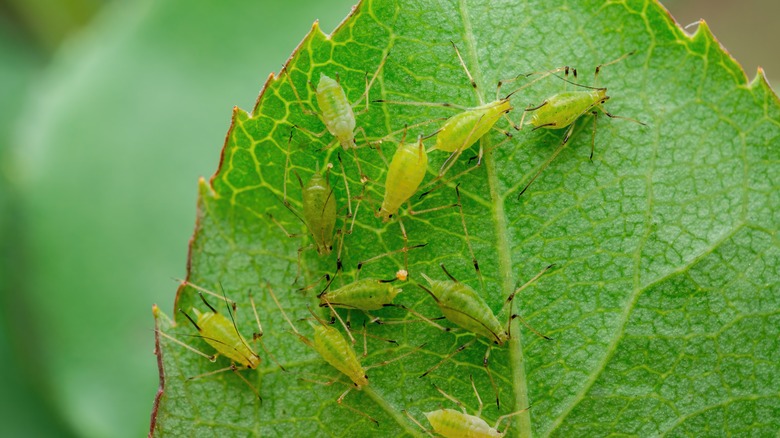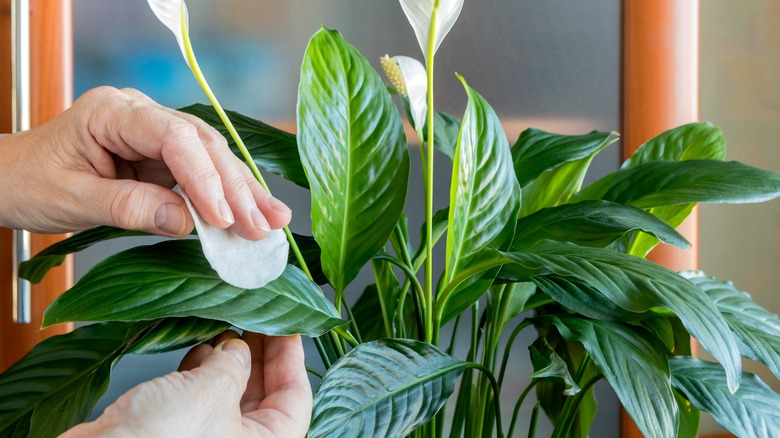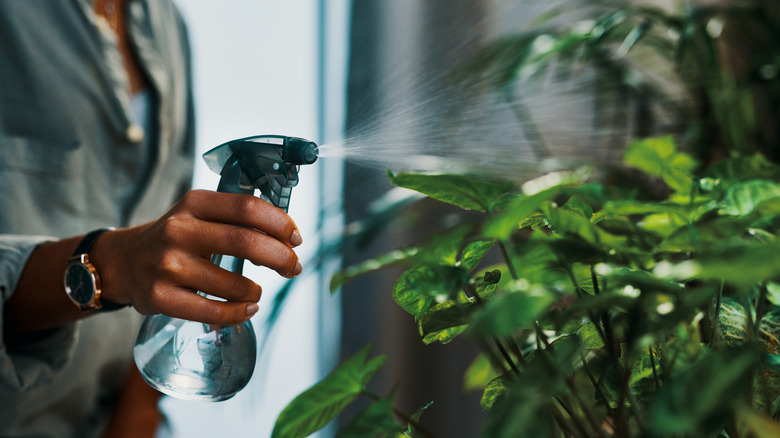This Bathroom Staple Will Help You Eliminate Aphids On Houseplants In A Pinch
Having a home garden is hard work, especially when you have to deal with pests dying to get at your plants. If your garden is inside the home rather than out in the yard, that doesn't mean you can be lax. Those pesky insects can very well find their way into your home, wreak their havoc, and be on their merry way. Aphids are tiny bugs, and as such, they remain virtually undetectable as they pierce and suck your plant's green leaves and stem. You likely won't even notice until you realize that the plant's growth has been stunted, and the leaves are turning yellow and withering. Fortunately, you can turn to one bathroom staple that will do the banishing on your behalf: rubbing alcohol.
Aphids are little, usually green, insects that literally suck the life out of your plant, leaving it discolored, weak, and withered. They often assemble under the leaves. A few aphids are probably nothing to worry about but a whole horde can take a significant toll on your garden. The usual technique for managing aphids is by simply blasting them off with cold water. However, for houseplants, this would mean taking them all outside so you don't turn your living room into a water park. Additionally, water doesn't exterminate the aphids. Rubbing or isopropyl alcohol, on the other hand, works to kill them on contact by drying up their bodies.
You have to dilute the rubbing alcohol before using on plants
Getting rid of aphids using rubbing alcohol is fairly simple, but there are still a lot of precautions to take. Isopropyl alcohol works as a desiccant, meaning that it can draw out the moisture from plants, destroying them. It is this trait that makes rubbing alcohol such an effective weed killer. Unfortunately, alcohol isn't selective and can also harm your plants. In order to effectively use it to kill aphids, you have to localize it and do a patch test first.
Dilute 70% rubbing alcohol by mixing it with an equal part of water. If you are using 95% alcohol, then you will have to mix it with one and a half parts of water instead. Patch test the solution on one of the leaves first to make sure it is safe. If you notice any discoloration or change at all after a couple of days, do not proceed. If safe, then you can either pour this solution into a spray bottle and spray the aphids off the underside of the leaves, or you can dip cotton balls in it and manually wipe the leaves free of the pests. Using the cotton balls is the safest method so that the spray setting doesn't affect the plant or soil.
Quality control your isopropyl alcohol before using it
One thing you have to be wary of when using rubbing alcohol to get rid of aphid pests is that sometimes, it can contain harmful additives or impurities. These can include other chemicals such as acetone, ethyl ether, and 1-propanol that can result in a health hazard for your plant. Make sure you purchase quality isopropyl alcohol from places like CVS Pharmacy or a local laboratory equipment and materials shop.
If you accidentally get rubbing alcohol on sensitive areas of your plant or even into the soil, then you risk your plant having burns or the soil being dehydrated. Since you diluted the alcohol, a loose drop or two won't kill it, but be sure to replenish the soil moisture with a little water.
Another thing to remember is that while isopropyl alcohol is very effective when it comes to killing aphids, it might not work against their eggs because it is a contact substance. You will have to wait out the hatching period when the nymphs come out before you can eliminate them with alcohol. If you don't want to wait out the hatching period, you can swipe the eggs off the host plant.


